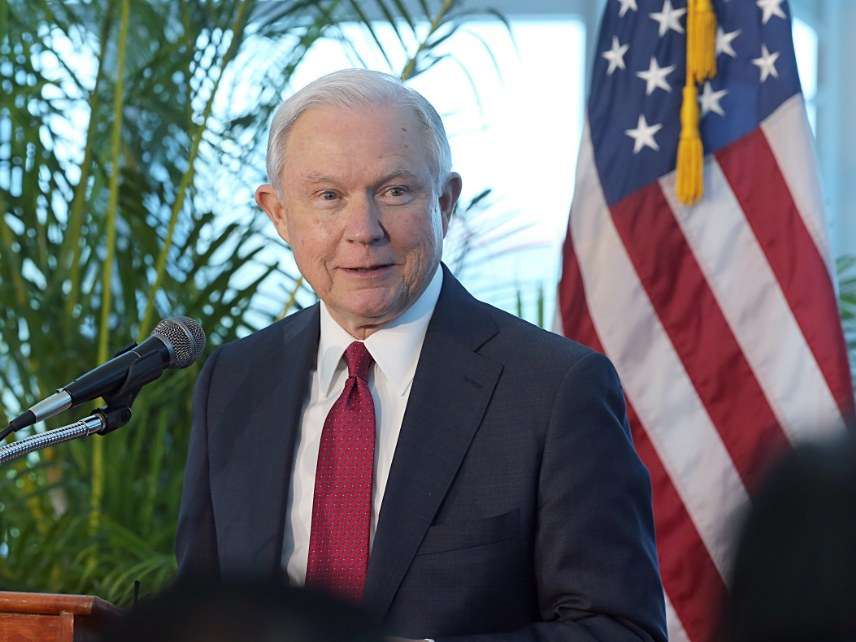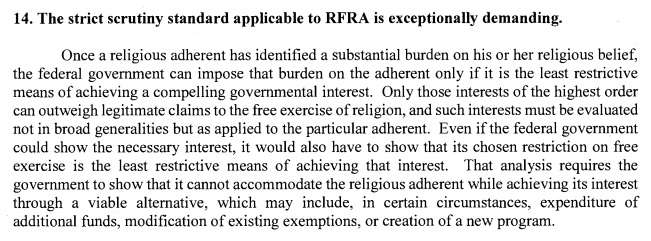Sessions Releases Guidance on Protecting Religious Freedom; LGBT Groups Fear 'Permission to Discriminate'
Mostly, memo reiterates what religious freedom protections mean.

Today, as President Donald Trump's administration is announcing that employers with religious concerns will have an easier time getting exemptions from the birth control mandate, Attorney General Jeff Sessions has released a lengthy memo describing the Justice Department's approach to religious freedom.
The timing is most likely not a coincidence. Sessions' 25-page memo discusses concerns about when the federal government may or may not impose mandates that violate the religious beliefs of businesses, and one of his points is bluntly titled "Americans do not give up their freedom of religion by participating in the marketplace, partaking of the public square, or interacting with government." It references the Hobby Lobby Supreme Court case rejecting contraception mandates.
The memo itself does not specifically reference gay or transgender people, but given that its instructions are about how Department of Justice agencies should take religious freedom issues in mind when enforcing laws, contracting, and distributing grants, there was an immediate concern from LGBT activist groups and allies that this was the "permission to discriminate" they've suspected the administration had been planning all along, but had not yet come.
Chad Griffin, president of the Human Rights Campaign, certainly didn't hold back in blasting the potential impact on gay and transgender people: "This blatant attempt to further Donald Trump's cynical and hateful agenda will enable systematic, government-wide discrimination that will have a devastating impact on LGBTQ people and their families. Donald Trump and Mike Pence have proven they will stop at nothing to target the LGBTQ community and drag our nation backwards. We will fight them every step of the way."
It's actually not terribly clear, though, that this memo makes much of a difference in how the current Justice Department will tackle LGBT discrimination issues because of how it is already tackling LGBT issues.
Understand, the Justice Department under Sessions is already reversing many of the positions it held under President Barack Obama. The Justice Department is now taking the position that federal civil rights laws do not include gay and transgender discrimination under the aegis of sex-based discrimination. The Trump administration has already retracted the guidance from the Obama administration mandating that schools accommodate transgender students in use of public restrooms and locker rooms. And the Justice Department in an upcoming Supreme Court case has taken the side of a baker in Colorado who declined to make a wedding cake for a same-sex couple (Disclosure: so has the Reason Foundation).
The Human Rights Campaign worries about some additional outcomes, though: That government officials themselves will be able to refuse to do their jobs when it comes to dealing with gay or transgender people (see: Kim Davis); and that federal contractors and faith-based organizations like hospitals would be able to discriminate against LGBT people and be able to refuse to provide services even in a crisis. So forget the wedding cakes: They're concerned about people getting turned away from hospitals or homeless shelters.
I don't want to dismiss the possibility of that happening, but it's important to note that religious freedom laws like the Religious Freedom Restoration Act do not just give blanket permission for people to violate the law by wrapping themselves in some holy scripture. Sessions knows that, and part of his memo explains what government officials have to show if they're going to try to overcome a person's religious objections:

So if the government can make a case that it has a compelling interest (like protecting public safety) and that it's taking the least restrictive means to do so it can require people to obey a law that hospitals not turn away gay or transgender people, for example.
The unanswerable concern, though, is whether a Sessions-run Justice Department actually would act in cases of emergencies or take steps to make sure that government agencies themselves treat LGBT people equally as the law demands when it comes to areas like marriage rights and benefits. If, indeed, a federal government employee refuses to process Social Security claims from somebody in a same-sex marriage, what happens? Clearly, given that same-sex marriages are legally recognized by the federal government, it cannot just refuse claims. Well, it could try, but I predict the courts are not interested in reconsidering the Supreme Court's ruling on gay marriage recognition and the government would lose.
In that respect, we'll have to see what the Justice Department actually does. Sessions has been careful to frame his reversals of Obama administrations' positions as different interpretations of the law not as anti-gay or anti-transgender posturing. If the Justice Department gives cover to government employees refusing to do their jobs or treat LGBT people equally under the law, it's going to be harder to explain as a legal interpretation.
Read Sessions' full memo here.
